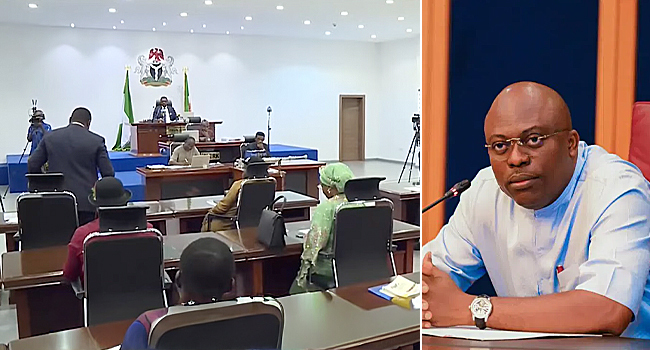The South East caucus in the House of Representatives has appealed to President Bola Tinubu to exercise presidential clemency for Nnamdi Kanu, leader of the Indigenous People of Biafra (IPOB), who was recently sentenced to life imprisonment.
Kanu was convicted last week on five of seven terrorism-related charges filed by the Federal Government. His trial was tense, with Justice James Omotosho ordering him out of the courtroom for contempt before delivering judgment. Shortly after sentencing, his lawyer, Aloy Ejimakor, confirmed that Kanu had been moved from the Department of State Services (DSS) facility in Abuja to a correctional centre in Sokoto.
Meeting on Monday at the National Assembly Complex, 42 South East lawmakers resolved to make a direct appeal to the President, warning that Kanu’s continued detention is worsening insecurity in the region.
Reading a communiqué titled “Appeal for a Political and Humanitarian Resolution in the Case of Mazi Nnamdi Kanu,” Ebonyi lawmaker Idu Igariwey said while the caucus respects the judiciary, the matter has evolved into a broader national concern requiring a political solution.
“Our responsibility requires us to speak with clarity when a legal matter evolves into a broader national concern with serious humanitarian, economic, and security consequences,” Igariwey stated.
The caucus urged Tinubu to invoke his constitutional powers under Section 175 to grant pardon, arguing that Kanu’s incarceration has fuelled agitation and undermined peace efforts in the South East.
“A presidential act of mercy at this time has the potential to de-escalate tensions, restore normalcy, and reduce the cycle of security operations and civil resistance,” the communiqué noted.
Lawmakers highlighted the social and economic disruptions caused by the crisis, including:
- Closure of markets
- Interrupted schooling
- Decline in commercial activity
They recalled Nigeria’s history of using presidential clemency to heal divisions, stressing that such a move now would demonstrate inclusiveness and leadership that prioritises unity.
“The release of Mazi Kanu, through pardon, would open space for broader engagement between the Federal Government, elected leaders, and community stakeholders to chart a sustainable and peaceful path forward,” Igariwey added.












